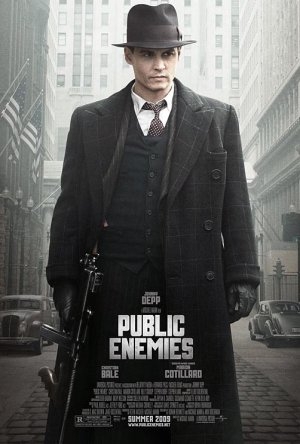 PUBLIC ENEMIES (2009, directed by Michael Mann, 140 minutes, U.S.)
PUBLIC ENEMIES (2009, directed by Michael Mann, 140 minutes, U.S.)
BY DAN BUSKIRK FILM CRITIC
It should have been a natural: action director Michael Mann and the Dillinger legend. Tommy guns, fedoras, prison breaks and the final gundown in the streets of Chicago; it is easy to imagine the tough-minded Mann making one of his most compelling films out of these elements. Such a film may be easy for Mann fans to imagine it but somehow the possibilities have completely escaped Mann himself, who has against all odds served up a joyless and unmoving portrait of the final year of The Great Depression’s Most Wanted Bankrobber.
Feeling tremendously over blown at two hours and twenty minutes, Public Enemies‘ long list of problems begins with its humdrum script, co-written by Mann and Irish screenwriter Ronan Bennett. Telling the story of Dillinger’s pursuit by G-Man Melvin Purvis, Public Enemies is a series of interchangeable bank robberies and narrow escapes strung together in an entirely random manner, rolling on without form or structure until Dillinger’s luck inevitably runs out. Mann strays from facts when it suits him (supplying the robber some romantic last words he never uttered) yet he refuses to give his story the momentum and the personal detail it needs to sweep us up in the tale, instead mounting familiar re-creations of gangster scenarios we’ve heard and seen countless time before.
If Mann’s mundane plotting drags the saga earthbound, it still lays down the groundwork for some energetic actor to run away with the show. Alas, no such actor has been cast. Instead we have the much-loved Johnny Depp, who, bless his talent, is just all wrong for the part. Maybe we’ve gotten far enough away from the era that we can just twist Dillinger into anything we want him to be, but the reserved, always in control character Depp plays seems nothing like the Dillinger we’ve seen in newsreels. In grainy old footage you can watch the real Dillinger joking and laughing, looking for the world like he’s the life of any party, even if he is the only guy at the shindig in hand cuffs. It’s not just that Depp’s reserved manner doesn’t resemble Dillinger’s, he plain doesn’t make sense as a character. Depp’s Dillinger is such a cool cucumber, we never see a glimpse of the type of mercurial mindset that would dare to run into a bank shooting, never see the cold-heartedness of a man who was comfortable pointing a gun at a man and taking his life. Softening up Dillinger with a doomed romance with the hat check girl may make him more relatable for audiences but it forsakes the distance that separates cold-hearted criminals from the rest of us.
There’s not much contrast in Christian Bale’s lawman Melvin Purvis either, as Bale again rolls out another jaw-clenched tough guy who lacks a sense of humor. Even with juicy cameos by Baby Face Nelson and Pretty Boy Floyd, Mann keeps a lid on things, squeezing the life out of every scene and oddly leaving the drama of bank robberies and prison breaks un-mined. Further undermining the story is the surprisingly ugly look of the film. Working with cameraman Dante Spinotti (who shot Mann’s similar Heat as well as L.A. Confidential), Mann has pushed the envelope beyond what digital cameras can currently deliver. The darkness of late night hideouts turn the screen into a murky brown where details disappear into a muddy blur; I have a hard time remembering a Hollywood film that looked less appealing. The hand-held digital style may be an attempt to add some modern friction to the setting but the look of the film so strays from our cinematic memories of the era and the genre that it tends to underline the fact that we’re watching a bunch of modern fellas in their grand-daddies‘ old clothes.
Getting out of this debacle with their skills unquestioned are Billy Crudup as the darkly driven head of the new Federal Bureau of Investigation, J. Edgar Hoover (I almost wish Dillinger was a Marvel super hero so Crudup’s Hoover could be spun off into his own movie next summer) and Marion Cotillard (La Vie En Rose’s Edith Piaf), who pines soulfully in a role that calls for that and little else. When Mann first arrived as the producer/director of Miami Vice, the critical line on him was that his “MTV Cops” show was all dazzle and no substance. Mann’s visceral style has found acclaim since then, but 25 years later, as the dazzle from his flashy style has become old hat, I can’t help but wonder if our first impressions of Mann were not dead on.
